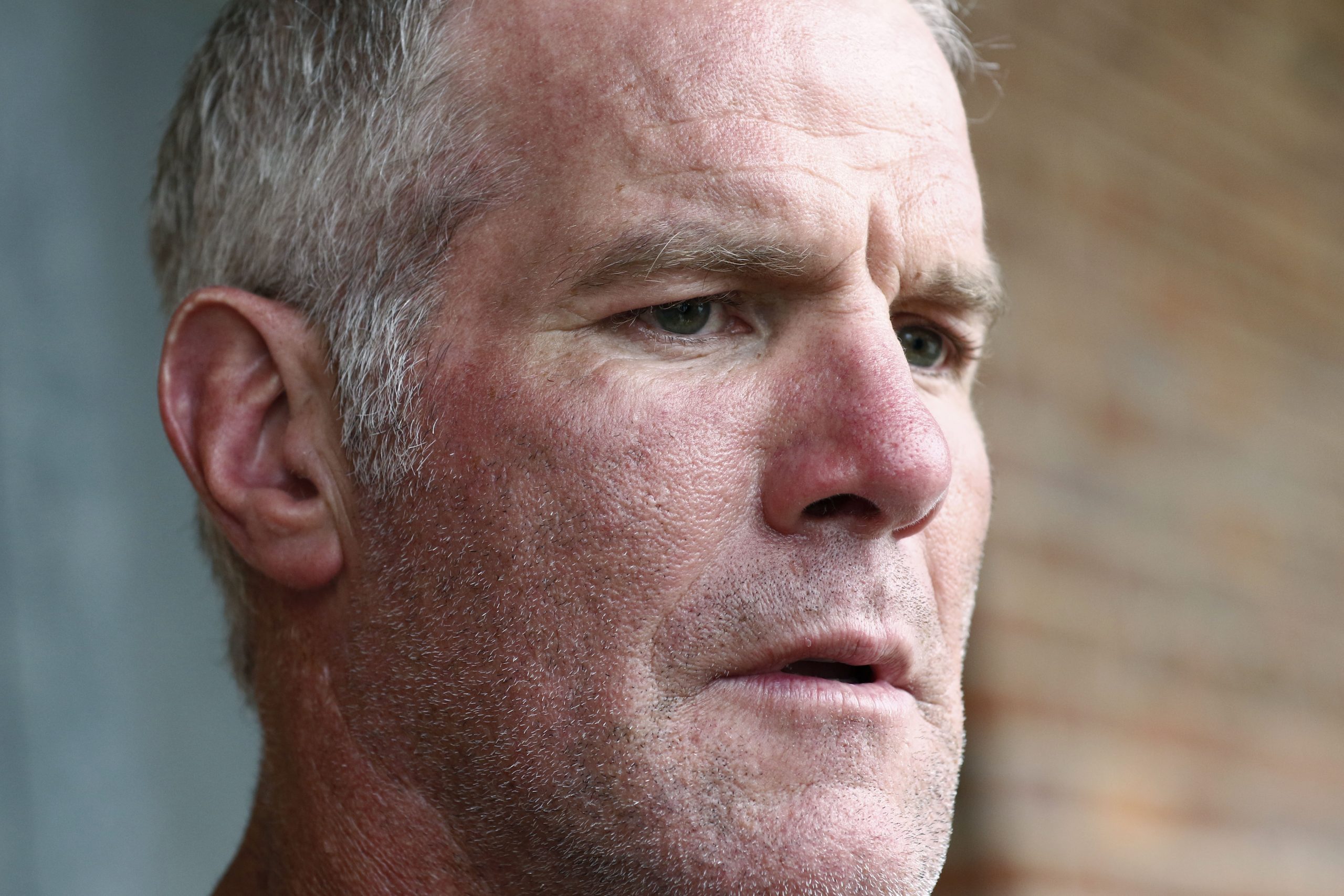Mississippi Today
Brett Favre interrogated in Hattiesburg about welfare funding

Attorneys interrogated former NFL quarterback Brett Favre about his involvement in the Mississippi welfare scandal for about eight hours Monday.
The questions centered on how Favre lobbied welfare officials for federal grant funds to support the construction of a volleyball stadium at University of Southern Mississippi and a pharmaceutical startup company in which the athlete was investing.
The scheduled deposition, which happened in Hattiesburg, relates to the ongoing civil lawsuit, not criminal proceedings. Favre is one of 47 defendants in a civil case that the Mississippi Department of Human Services, the state's safety net agency, filed in an attempt to recoup $77 million in misspent or stolen welfare funds.
Much of the state's case rests on text messages between officials and Favre, which lawyers say demonstrate that Favre knew the funds were supposed to serve the needy and that there were federal restrictions for using the money to erect buildings. Favre also personally received $1.1 million from the public agency, which officials funneled through two payments from a private nonprofit in 2017 and 2018, to cut radio ads for the state's anti-poverty initiative.
“Will the public perception be that I became a spokesperson for various state funded shelters, schools, homes etc….. And was compensated with state money? Or can we keep this confidential,” Favre texted the nonprofit operator, Nancy New, who channeled the funds to Favre's projects.
Favre has since returned the $1.1 million. In the past, Favre has argued it's unreasonable that he would have known such a deal was illegal or unethical since multiple lawyers, state employees and public officials – all the way up to former Gov. Phil Bryant – were on board with it. New alleged in a 2022 court filing that Bryant directed her to pay the money to Favre. Bryant has denied any involvement in the deals to use welfare money for Favre's volleyball or pharmaceutical projects.
“The agreement (that funded the volleyball stadium) was reviewed and approved by the Attorney General, who recommended that the IHL Board of Trustees approve it, which they did,” reads Favre's unsuccessful motion to dismiss the civil suit. “The IHL Board of Trustees expressly noted that MCEC's funding was via a block grant from MDHS. The Governor was aware of the source of the funding and supported it. Following final approval, Southern Miss publicly announced the plans for the State-owned Wellness Center and lauded MCEC's support for the project. Not one public Mississippi official or lawyer expressed any objection to or concern about the funding and plan.”
While the state has held some people accountable for the expenditure — New's son Zach New, for instance, pleaded guilty to a felony fraud charge related to the expenditure and the civil suit targets two lawyers, Jacob Black and Garrig Shields, for their involvement — Bryant has not faced any civil or criminal charges.
Bryant heavily touted the initiative, called Families First for Mississippi, that welfare officials used to justify most of the purchases that auditors and attorneys are now scrutinizing. New and the former welfare director Bryant appointed, John Davis, have pleaded guilty to several state and federal charges and are awaiting what could be years-long prison sentences.
This article first appeared on Mississippi Today and is republished here under a Creative Commons license.
Mississippi Today
On this day in 1896


MAY 18, 1896

The U.S. Supreme Court ruled 7-1 in Plessy v. Ferguson that racial segregation on railroads or similar public places was constitutional, forging the “separate but equal” doctrine that remained in place until 1954.
In his dissent that would foreshadow the ruling six decades later in Brown v. Board of Education, Justice John Marshall Harlan wrote that “separate but equal” rail cars were aimed at discriminating against Black Americans.
“In the view of the Constitution, in the eye of the law, there is in this country no superior, dominant, ruling class of citizens,” he wrote. “Our Constitution in color-blind and neither knows nor tolerates classes among citizens. In respect of civil rights, all citizens are equal before the law. The humblest is the peer of the most powerful. The law … takes no account of his surroundings or of his color when his civil rights as guaranteed by the supreme law of the land are involved.”
This article first appeared on Mississippi Today and is republished here under a Creative Commons license.
Did you miss our previous article…
https://www.biloxinewsevents.com/?p=359301
Mississippi Today
Renada Stovall, chemist and entrepreneur
Renada Stovall sat on the back deck of her rural Arkansas home one evening, contemplating life when she had a life-altering epiphany…
“I gotta get out of these woods.”
She heard it as clear as lips to her ear and as deep as the trees surrounding her property. Stovall's job as a chemist had taken her all over the country. In addition to Arkansas, there were stints in Atlanta, Dallas and Reno. But she was missing home, her parents and friends. She also knew, she needed something else to do.
“I thought, what kind of business can I start for myself,” said Stovall, as she watered herbs growing in a garden behind her south Jackson home. Some of those herbs are used in her all-natural products. “I know when I lived in Reno, Nevada, where it's very hot and very dry, there really weren't products available that worked for me, my hair, and my skin suffered. I've got a chemistry degree from Spelman College. I took the plunge and decided to create products for myself.”

In 2018, Stovall's venture led to the creation of shea butter moisturizers and natural soaps. But she didn't stop there, and in December 2022, she moved home to Mississippi and got to work, expanding her product line to include body balms and butters, and shampoos infused with avocado and palm, mango butter, coconut and olive oils.
Nadabutter, which incorporates Renada's name, came to fruition.

Stovall sells her balms and moisturizers at what she calls, “pop-up markets,” across the state during the summer. She's available via social media and also creates products depending on what of her ingredients a customer chooses. “My turmeric and honey is really popular,” Stovall added.
“The all-natural ingredients I use are great for conditioning the skin and hair. All of my products make you feel soft and luscious. The shea butter I use comes from West Africa. It's my way of networking and supporting other women. And it's my wish that other women can be inspired to be self-sufficient in starting their own businesses.”





This article first appeared on Mississippi Today and is republished here under a Creative Commons license.
Mississippi Today
On this day in 1954
MAY 17, 1954

In Brown v. Board of Education and Bolling v. Sharpe, the U.S. Supreme Court unanimously ruled that the “separate but equal” doctrine in Plessy v. Ferguson was unconstitutional under the 14th Amendment, which guaranteed equal treatment under the law.
The historic decision brought an end to federal tolerance of racial segregation, ruling in the case of student Linda Brown, who was denied admission to her local elementary school in Topeka, Kansas, because of the color of her skin.
In Mississippi, segregationist leaders called the day “Black Monday” and took up the charge of the just-created white Citizens' Council to preserve racial segregation at all costs.
This article first appeared on Mississippi Today and is republished here under a Creative Commons license.
-
SuperTalk FM6 days ago
Martin Lawrence making 3 stops in Mississippi on comedy tour
-
Our Mississippi Home4 days ago
Beat the Heat with Mississippi’s Best Waterparks
-
SuperTalk FM2 days ago
State auditor cracking down on Mississippians receiving unemployment benefits
-
Our Mississippi Home5 days ago
Charlie’s U-Pik: Opening Soon for the Summer Season
-
Mississippi News Video4 days ago
Jackson has a gang problem
-
Kaiser Health News5 days ago
Medicaid ‘Unwinding’ Decried as Biased Against Disabled People
-
228Sports4 days ago
George County Pours Runs In 6A South State Title Victory At PRC
-
Mississippi Today3 days ago
On this day in 1950









































